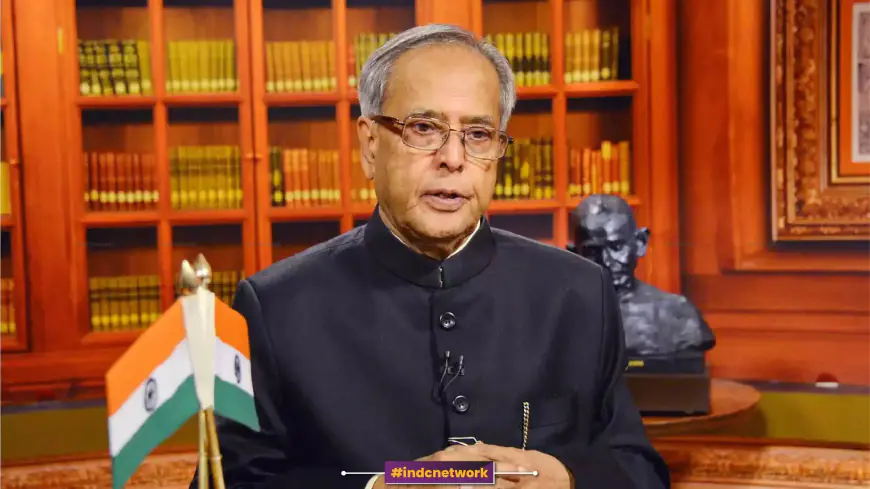Pranab Mukherjee: A Glorious Political Journey and Tenure as President of India from 2012 to 2017
Pranab Mukherjee served as the thirteenth President of India from 2012 to 2017, bringing decades of political experience and diplomatic acumen to the office. Born on December 11, 1935, in West Bengal, Mukherjee had a distinguished career in public service, holding various key ministerial roles before his presidency. His tenure focused on economic reforms, inclusive governance, and strengthening India’s international relations. Mukherjee’s deep understanding of the constitutional framework and political landscape enabled him to navigate complex challenges while promoting social justice and national unity. His legacy includes contributions to education, poverty alleviation, and enhancing India’s global standing.

INDC Network : Biography : Pranab Mukherjee: A Glorious Political Journey and Tenure as President of India from 2012 to 2017
Biography of Pranab Mukherjee (2012–2017)
Early Life and Education : Pranab Mukherjee was born on December 11, 1935, in Mirati, a small village in the Birbhum district of West Bengal, India. He was the son of Freedom Fighter and prominent Congress leader, Late Raj Kumar Mukherjee, and his mother, Late Kamala Mukherjee, a housewife. Growing up in a politically active household, Mukherjee was exposed to the values of nationalism and public service from an early age.
He completed his schooling at the Suri Vidyasagar College and graduated with a Bachelor’s degree in Economics from the University of Calcutta. Mukherjee further pursued his studies in political science and economics, earning a Master’s degree in both subjects. His academic achievements laid a strong foundation for his future political career.
Early Political Career
Pranab Mukherjee’s political journey began in the 1960s when he joined the Indian National Congress (INC). His entry into politics coincided with a transformative period in India’s history, as the nation was grappling with post-independence challenges. Mukherjee quickly rose through the ranks of the party, showcasing his political acumen and dedication to public service.
In 1969, he was elected to the Rajya Sabha, the upper house of the Indian Parliament, marking the beginning of a long and illustrious political career. His initial roles included serving on various parliamentary committees, where he gained insights into governance and legislative processes.
Ministerial Positions
Over the years, Mukherjee held several key ministerial positions in various governments led by the Congress party. His expertise in economics and finance led to his appointment as the Minister of Finance from 1982 to 1984. During this time, he played a pivotal role in shaping India’s economic policies, laying the groundwork for future reforms.
In 1991, when India faced a severe balance of payments crisis, Prime Minister P. V. Narasimha Rao appointed Mukherjee as the Finance Minister again. He was instrumental in implementing liberalization policies that opened up the Indian economy to foreign investment and trade. His bold initiatives during this critical juncture helped stabilize the economy and set the stage for rapid growth in subsequent years.
Mukherjee also served as the Minister of External Affairs and the Minister of Defence, further expanding his influence in national and international affairs. His vast experience in various ministries equipped him with a comprehensive understanding of the complexities of governance.
Election as President
In 2012, following the end of Pratibha Patil’s tenure, Pranab Mukherjee was nominated as the candidate for the President of India by the United Progressive Alliance (UPA). His long-standing service in public life, coupled with his rich political experience, made him a suitable candidate for the highest constitutional office.
Mukherjee was elected as the thirteenth President of India on July 22, 2012, securing a significant majority in the electoral college. His election was met with widespread acclaim, as he was seen as a unifying figure capable of representing the diverse interests of the nation.
Presidency (2012–2017)
Pranab Mukherjee took office as President of India on July 25, 2012. His presidency was marked by a commitment to inclusive governance, economic reforms, and strengthening India’s international relations. Mukherjee was known for his deep understanding of the constitutional framework and his ability to navigate complex political challenges.
One of the central themes of Mukherjee’s presidency was the promotion of social justice. He often emphasized the importance of ensuring that marginalized communities had access to education, healthcare, and economic opportunities. His speeches frequently highlighted the need for a more equitable society, where the benefits of development reached all citizens.
Focus on Economic Reforms
During his presidency, Mukherjee continued to advocate for economic reforms that aimed to enhance India’s growth trajectory. He recognized the need for structural changes in the economy to address challenges such as unemployment, inflation, and poverty.
Mukherjee supported initiatives aimed at boosting entrepreneurship, encouraging investment in key sectors, and promoting skill development among the youth. He believed that empowering individuals through education and vocational training was essential for building a prosperous and inclusive nation.
His economic vision was closely aligned with the concept of “Sabka Saath, Sabka Vikas” (Together with all, Development for all), which emphasized inclusive growth as a guiding principle for governance.
Strengthening International Relations
As President, Pranab Mukherjee played a vital role in strengthening India’s international relations. He recognized the importance of diplomacy in addressing global challenges and promoting India’s interests on the world stage.
Mukherjee undertook numerous state visits to various countries, engaging with world leaders and fostering diplomatic ties. He emphasized the need for collaboration in areas such as trade, security, and climate change. His efforts were aimed at positioning India as a key player in international affairs, capable of contributing to global stability and prosperity.
One of the highlights of his presidency was his participation in international forums, including the G20 summits, where he advocated for cooperation among nations to tackle pressing issues such as economic inequality and sustainable development.
Advocacy for Education and Skill Development
Pranab Mukherjee was a strong proponent of education as a catalyst for social change. He understood the transformative power of education in empowering individuals and communities. Throughout his presidency, he focused on promoting quality education, particularly for marginalized sections of society.
He often visited educational institutions and interacted with students, encouraging them to pursue their dreams and contribute to nation-building. Mukherjee’s emphasis on skill development aimed to bridge the gap between education and employment, ensuring that the youth were equipped with the necessary skills to thrive in a rapidly changing economy.
Role in the Parliament
As President, Mukherjee upheld the dignity and sanctity of the office while maintaining a close relationship with Parliament. He frequently addressed both houses, providing guidance on legislative matters and emphasizing the importance of constructive dialogue between the ruling party and the opposition.
Mukherjee’s experience as a seasoned politician allowed him to navigate the complexities of parliamentary democracy. He often called for cooperation among political parties to address pressing issues facing the nation, advocating for consensus-building and effective governance.
Promoting National Unity
Pranab Mukherjee was a staunch advocate for national unity and communal harmony. He understood the diversity of India and believed that it was essential to promote understanding and respect among different communities. His presidency coincided with a period marked by social tensions, and he consistently urged citizens to embrace inclusivity and coexistence.
Mukherjee’s speeches often emphasized the importance of pluralism, highlighting India’s rich tapestry of cultures and traditions. He encouraged citizens to celebrate diversity as a strength rather than a division, promoting the idea of a united India.
Legacy and Impact
Pranab Mukherjee’s presidency left a lasting impact on the political landscape of India. His extensive experience in public service, coupled with his commitment to social justice and inclusive governance, resonated with citizens across the country.
His legacy is characterized by his efforts to strengthen democratic institutions, promote economic reforms, and enhance India’s global standing. Mukherjee’s presidency is remembered for its focus on education, poverty alleviation, and the empowerment of marginalized communities.
Even after leaving office in 2017, Mukherjee continued to engage with various social and educational initiatives. He remained an influential figure in public life, sharing his insights and experiences with the younger generation.
Awards and Recognition
Throughout his illustrious career, Pranab Mukherjee received numerous awards and honors for his contributions to politics and public service. He was awarded the Bharat Ratna, India’s highest civilian honor, in 2019 for his exceptional contributions to the nation.
Mukherjee’s dedication to education and social welfare earned him accolades from various organizations and institutions. His writings, including his autobiography "The Coalition Years," reflect his deep understanding of Indian politics and governance.
Conclusion : Pranab Mukherjee’s journey from a small village in West Bengal to the highest office in India is a testament to his resilience, dedication, and commitment to public service. As the thirteenth President of India, he played a pivotal role in shaping the nation’s trajectory during a critical period in its history.
His presidency was marked by a focus on social justice, economic reforms, and strengthening India’s international relations. Mukherjee’s contributions continue to inspire future generations of leaders and citizens, emphasizing the importance of inclusivity, education, and national unity.
As India navigates the complexities of the modern world, the principles and values championed by Pranab Mukherjee remain relevant, serving as a guiding light for those striving for progress and social change in the country.
What's Your Reaction?








































































































































































